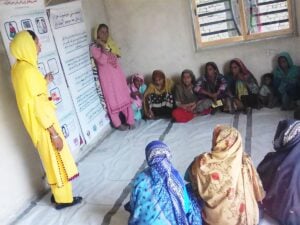COVID-19 risks reversing gains made on women’s reproductive health in Pakistan
Authored by: Katie Bigmore & Pamela Sequeira
The COVID-19 pandemic will place additional burden on women and girls in Pakistan, creating further challenges to access reproductive health services. This could result in an increase in unintended pregnancies, unsafe abortions, and maternal deaths.
Emerging evidence suggests that as a result of COVID–19, women and girls are likely to see a reduction in access to quality health services, essential medicines and vaccines, and maternal and reproductive health care and experience an increased health risks as a result.
There are multiple factors driving this, some of which are heightened by the lockdown measures. One is restrictive social norms and gender stereotypes. Another is that violence against women and girls is likely to increase as the COVID-19 crisis combines with economic and social stresses and the measures to restrict contact and movement. Crowded homes, substance abuse, increased barriers to access health services and reduced peer support have the potential to exacerbate these conditions.
of which are heightened by the lockdown measures. One is restrictive social norms and gender stereotypes. Another is that violence against women and girls is likely to increase as the COVID-19 crisis combines with economic and social stresses and the measures to restrict contact and movement. Crowded homes, substance abuse, increased barriers to access health services and reduced peer support have the potential to exacerbate these conditions.
Integrity is delivering third-party monitoring (TPM), validation and research services to FCDO’s Delivering Accelerated Family Planning in Pakistan (DAFPAK) programme. We provide FCDO with regular updates, insights, and greater assurance on progress in delivering the programme. Integrity undertakes third–party validations in all implementation districts across Punjab, Sindh, Khyber Pakhtunkhwa, and Baluchistan.
After the spread of the outbreak to Pakistan, Integrity has adapted its monitoring, validation and research work for DAFPAK and introduced new ways to assess the impact of COVID-19 on family planning (FP) services. Over the next 4 months we are conducting:
- Rapid Reviews: We will monitor the effects on family planning services, reviewing any changes to access, coverage, availability and equity of services. We will use a mix of quantitative and qualitative primary data collection methods, to provide insights on a) delivery of family planning services and new COVID-19 activities and b) identify lessons from implementation, including innovations and challenges.
- Research: We will utilise secondary data to review whether COVID–19 is likely to have a wider effect on DAFPAK results on averting unintended pregnancies, unsafe abortion (at outcome levels) plus on reducing maternal mortality (at impact levels).
The findings of the rapid reviews and research will be shared with FCDO and partners in online learning workshops during July and August 2020.
Get in touch to discuss how Integrity can support your programmes through additional MEL support in times of crisis.
Email us: [email protected]









